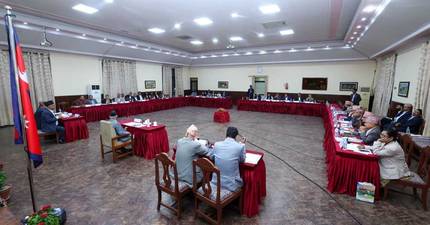Kedar Bhakta Mathema, the former Tribhuvan University Vice-chancellor and his team members handed over the report on the much-awaited medical education policy to Prime Minister of Nepal. The policy is expected to direct the country’s future course of medical education
The basic premise of Mathema’s report is that people should have the right to access healthcare regardless of where and how they live.
Here goes the top recommendation of Mathema’s report on “Health Profession Education Policy”
- Overhauling of the entire system of health education and health systems, starting with decentralization of Medical colleges. According to the report, the Letter of Intent (LoI) will not be issued to any hospitals in Kathmandu Valley for any of the undergraduate courses, including MBBS, Dentistry and Nursing for the next 10 years.
- Current scenario: Among the country’s 23 medical colleges , seven lie inside the Kathmandu Valley.
- Creating directorates that will be responsible for providing accreditation, holding entrance examinations at medical colleges and monitoring medical institutions, among other tasks.
- Current Scenario: The Nepal Medical Council (NMC) has the sole authority to conduct licensing exams, regulate doctors and monitor medical colleges, among other tasks. NMC routinely been buffeted by controversies stemming from their inability to monitor medical colleges, taking undue favor from private medical colleges, and allowing colleges with substandard facilities to run programs.
- No new medical institution, even if the founders have already invested in its infrastructure, shall be allowed to be established inside Kathmandu Valley. The investors, if they so wish, can instead hand the college over to the government.
- Current scenario: these incipient institutions include the Manmohan Memorial Institute of Health Sciences, chaired by CPN-UML lawmaker Rajendra Pandey; the National Medical College, an extension of the Birgunj-based National Medical College promoted by UCPN (Maoist) loyalist Basaruddhin Ansari; and the People’s Dental College, run by Sunil Sharma, who has support from the Maoists and the Nepali Congress.
- Colleges ho have received letter of intent (LOI) if wish to run other health programmes in the property or do something new with it, they can do it, but No more medical colleges in Kathmandu Valley.
- As for the colleges that had been granted the LoI in the past with required infrastructure, the Clause 2.3.1 of the policy states that the college owners may sell the property to the government.
- From now on no university will be allowed to provide affiliation to more than five medical colleges . “This policy will not be applicable to universities that have already provided affiliations,” states the report which also proposes that no university can provide affiliation if they do not have their own medical college.
- Only one medical college can be established in one district.
- Affiliated colleges can admit only 100 students in the MBBS programme and 50 students in the dental programme, with the committee fixing the fees at Rs 3.5 million and Rs 1.8 million for the respective programmes.
- The Clause 2.14 of the report states that any medical college that fails to maintain the pass rate of at least 75 percent in two consecutive examinations will be deaffiliated.
- Government should promote other institutions to go to the colleges. “It can provide tax waiver, provide land on lease and others,” the report states.
Download the report of Mathema Commission here
Private Medical/Dental colleges has said that they do not agree with this recommendation. See their press release....

Various unions of Private Medical College also issued a press release citing Mathema's report is not favoring the welfare of staffs.













